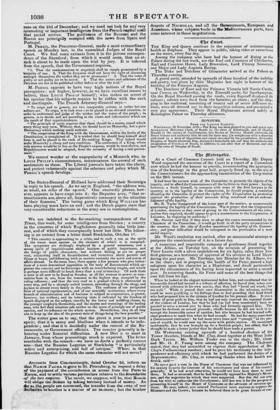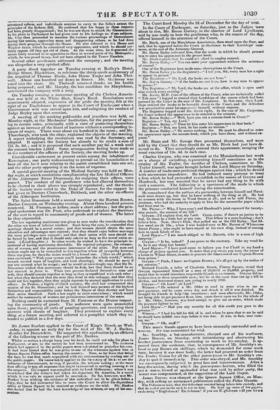rbe inetrupulie.
At a Court of Common Councii held on Thursday, Mr. Deputy Wood requested the attention of the Court to a report of a Committee over which he had the honour to preside, recommending the appropriation of the hustings in the great hall, properly -fitted up, to the use of the Commissioners for the approaching examination of the Corporation on the 26th instant.
It had been the earnest wish of the Committee to promote the objects of the inquiry, and to afford the Commissioners all the facilities in their power : having, however, a doubt himself, in common with some of the first lawyers in the country, as to the legality of the Commission he should propose a resolution directing the Committee to protect the rights of the Corporation by protesting against the production of their accounts being construed into an acknowledgment of the legality. Mr. R. Taylor disapproved of the latter part of the motion, as unnecessarily questioning the legality of the Commission. Was it proper that the Corporation of Loudon, desirous as they were of giving to the Commissioners all the information they required, should appear to give a countenance to the Corporation of Leicester, by disputing its authority ? Mr. Stevens said that if they were to adopt the course recommended by the i Chairman of the Committee, t would go forth to all the petty corporations in the country, that the city of London questioned the legality of the Commission • and great difficulties would be interposed to the prosecution of a most useful inquiry.
Mr. Wood's resolution was carried, after an unsuccessful attempt to postpone the consideration of it to a future day.
A numerous and respectable company of gentlemen dined together at the Albion, on Tuesday last, on the occasion of presenting Sir Peter Laurie with a silver candelabrum for six lights, value three hundred guineas, as a testimony of approval of his services as Lord Mayor during the past year. Mr. Easthope, late Member for St. Albans, was in the chair; and in proposing the health of Sir Peter, passed a high eulogium upon his character as a Magistrate, and dwelt particularly upon the circumstance of his having been requested to serve a second year. In returning thanks, Sir Peter said some of the best things that ever fell from his lips.
When he looked at the elegant testimonial before him, and recollected that his honourable friend had termed it a tribute of affection, he feared that, when considered with reference to his own merits, that they had "loved not wisely, but too well." While it proved their own discernment in the selection, nothing could be more gratifying to his feelings than to find presiding that kind friend who had proposed him to the citizens of London for his present office. It was a matter of great pride to him that he had not only received the repeated thanks of the citizens of London, but that he had (as had been mentioned) been requested to serve a second year by those who had formerly opposed him. This honour he declined, on several grounds; chiefly because he did not wish to interrupt the honourable career of another, but also because he had learned sof& tient prudence to teach him when he had enough. He had for many years been a Government contractor : he had some years since said "enough" in the pursuit ofwealth, he would now say the same with public station. He mentioned incidentally, that he was brought up for a Scottish pulpit ; but added, that he thought he made a better justice than he should have made a parson. On Wednesday evening, upwards of a hundred electors of the Tower Hamlets, friends of Mr. Clay, dined together at the West India Dock Tavern. Mr. William Tooke was in the chair ; Mr. Grote and Mr. G. F. Young were among the company. The Chairmen stated, that they had assembled to express their approbation of Mr. Clay's Parliamentary conduct ; and be gave his testimony to the independence and efficiency with which he had performed the duties of a Representative. Mr. Clay, in returning thanks when his health was drunk, said— He never gas e a vote in the House of Commons that was not influenced by his anxiety to woe the interests of his constituents and those of his country generally. If he had acted otherwise, he would not have been there to meet them. It had so occurred, that he had frequently opposed his Majesty's Mini$* Sean, and the majorities by which they were supported. But this did not arise from his wish-to embarrass the Government; still less was it for the purpose of .presenting himself in the Home of Commons as the advocate of extreme opinions. No man, indeed, ever entered Parliament more anxious to sommrt the Ministers and the Crown; because he believed them to be great friends of con • stitutional reform, and individuals anxious to carry to the .fullot -Went the principles of the Reform Bill. He confessed that his hopes in these respects had been greatly disappointed ; but he was not there to attack the Government. In his place in Parliament he had given vent to his feelings on Otte subjects. Mr. Clay then proceeded to mention the various proceedings of Governmeet during last session, approving some and disapproving others, as he bad done durinv, their progress through the House. He also referred to ti e House and Window taxes, which he considered very oppressive, and which he should certainly oppose till they got rid of them. At the same time, he dtrecated the means lately resorted to in opposition to them in several parts of the Ideteopolis; which, he was proud to say, had not been adopted in the Tower Hamlets.
Several other gentlemen addressed the company ; and the meeting was altogether a very spirited affair.
A party dined together on Tuesday evening at Radley's
Bridge Street, Blackfriars, to celebrate the thirty-ninth anniversary of the acquittal of Thomas Hardy, John Horne Toqke and John Thelwall. About one hundred sat down to dinner. Mr. Galloway was voted into the chair. Mr. Thelwall returned thanks on his health being proposed ; and Mr. Murphy, the late candidate for Marylebone, entertained the company with a song.
On Tuesday evening, a numerous meeting of the Chelsea Association was held at the 1Vhite Hart, King's Road. Resolutions were unanimously adopted, expressive of the pride the meeting felt at the right of an Englishman to appear in the Court of Exchequer when a Government writ was served upon him, and eulogizing the conduct of Judge Bayley upon that occasion.
A meeting of the working goldsmiths and jewellers was held, on Monday night, at the Mechanics' Institution, for the purpose of agreeingto certain rules, principally with a view of protecting themselves against an increase of the hours of business without a corresponding increase of wages. There were about six hundred in the room; and Mr. Thornburgh, who took the chair, explained the objects of the meeting. A report embodying the resolutions was read by the Secretary, and adopted. It appears the Society has already to its credit -a sum of 71/. 3s. 6d.; and it is proposed that each member pay 6d. a week until the amount reaches 1,0301. Some arrangements having been made as to the conduct of the officers of the Society, the meeting broke up.
Considerable excitement at present exists among the inhabitants of Kensington ; one party endeavouring to prevail on the householders to have all the local acts relating to the parish consolidated -into One act, and the other party opposing it on the score of expense.
A special general meeting of the Medical Society was held on Monday night, at which resolutions complimenting the late Medical Officers , of the Aldersgate Street Dispensary, for resigning their offices, were passed. The conduct of the gentlemen who had allowed themselves to be elected in their places was strongly reprobated; and the thanks of the Society were voted to the Duke of Sussex, for the support he had given to Doctors Clutterbuck, Birkbeck, and the other ex-officers of the Aldersgate Institution.
The Saint Simonians held a second meetingat the Burton Rooms, Burton Crescent, on Wednesday evening. About three hundred persons mustered. M. Fontana, as before, made a short address ; but the principal spokesman was Dr. Pmti, who undertook to explain the doctrines of the sect in regard to community of goods and of women. The latter he thus expounded.
The law regulating matrimony was given to men under the consideration that the other sex were of inferior intellect. Such being the case, he contended that marriage should he a moral union; and that women should obtain the same education and advantages men enjoyed ; that they should enjoy before marriage the same privileges men enjoyed ; and that their union with men should not be forced by law, and that it should only subsist as long as the moral union existed. (Loud laughter.) In other words, he wished to have the principle introduced of having matrimony dissoluble. He rejected polygamy, the community of women, and the promiscuous intercourse of the sexes. But man and woman ought not to be compelled to live together when all sympathy between. them was gone, for then the union-would he a forced one. [Here an old gentleman exclaimed, "With your system you'll bastardize the whole world ;" which remark excited roars of laughter, and loud cheering]. He should be sorry if any one mistook what he meant; and he would at once simply say, that the St. Simonians wished that matrimony should be holy, but that there-should he no law enacted to force it. When two persons declared themselves man and wife, they should remain together as long as they sympathized with each other ; but when they declared that the state they lived in was unhappy, and that 'they could not live together, then they might separate by mutual application to a civil officer. In Prussia, a highly civilized country, the civil law consecrated this maxim of the St. Simomans ; and he had himself seen-persons of the highest distinction and respectability come before the Mayor of their district and have their union dissolved. Such a law ought to exist everywhere ; which would neither be community of women nor promiscuous intercourse of 'the sexes.
Nothing could be extracted from M. Fontana or the Doctor respecting the community of goods. The audience were quite unmerciful upon them ; putting all sorts of puzzling questions, and receiving their answers with shouts of laughter. They promised to explain _every thin.. at a future meeting, and referred to a pamphlet which they intended to publish in a few days.





















 Previous page
Previous page